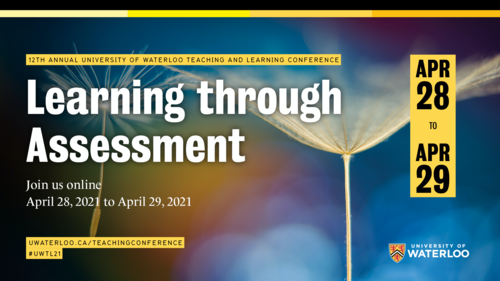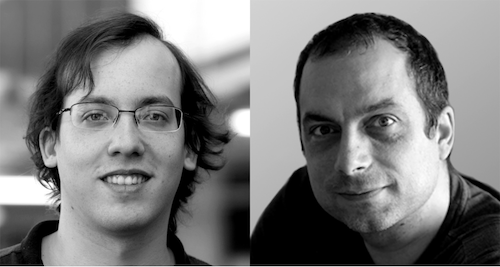The Daily Bulletin is published by Internal and Leadership Communications, part of University Communications
Contact us at bulletin@uwaterloo.ca
Submission guidelines
Editor:
Brandon Sweet
University Communications
bulletin@uwaterloo.ca
This week, Waterloo Region officially moved into the “red zone” of the Province of Ontario’s COVID-19 response framework. Being in this red or “control” zone means some changes to campus operations.
Director of Safety Kate Windsor sent a memo to campus earlier this week that outlines what the impact this red zone designation will have on the University:
The University is also prepared to deal with cases of the virus in various scenarios. There are protocols in place to address individual cases of COVID-19, outbreaks and scaling back campus operations. "We will also continue to adapt to any new guidance from the Province of Ontario and public health authorities," says the Safety Office memo. "Department heads, managers, instructors and others responsible for operational safety plans should be prepared for what an eventual shift to the “grey” or lockdown category of the Province’s framework might mean for your area and plan accordingly."
The Safety Office is working on what a lockdown would mean for classes and labs, and they will provide further guidance to affected groups shortly. If you have any questions, contact coronavirus@uwaterloo.ca.

A message from the Centre for Teaching Excellence (CTE).
Submit a proposal for the University of Waterloo’s 12th annual Teaching and Learning Conference, taking place April 28 and April 29, 2021. Because the COVID-19 pandemic forced the cancellation of our 2020 conference, the conference will be proceeding with the theme of “Learning Through Assessment” that had planned for that year. This year’s conference will be held entirely online.
In a previous annual Teaching and Learning Conferences (2014), instructors, staff, and students grappled with the concept of assessment of learning and started to rethink how assessment could do more than just evaluate what a learner has accomplished. Now, six years later, we return to the concept of assessment, aware of the powerful learning opportunities that come with thoughtful, well-designed, student-centered assessment practices. As such, we question assessment’s underlying purpose and focus on the concept of assessment for learning – assessment that is learner-centered, encourages interaction and participatory learning, and provides opportunities for meaningful feedback and self-evaluation. Done well, such assessments give students more control of their learning. As educators, we too benefit from assessment practices that best support our students in their educational journeys.
We invite proposals for presentations, panel discussions, workshops, poster presentations, and an assessment showcase that share your practices and research.
For more information check out the Call for Proposals website.

Left to right: Cheriton School of Computer Science Professors Shalev Ben-David and Eric Blais.
This is an excerpt of an article originally published on the Cheriton School of Computer Science website.
Cheriton School of Computer Science Professors Shalev Ben-David and Eric Blais have received a prestigious best paper award at FOCS 2020, the 61st Annual IEEE Symposium on Foundations of Computer Science. FOCS and its counterpart — the Symposium on Theory of Computing — are the top international meetings in theoretical computer science.
Their award-winning paper, A New Minimax Theorem for Randomized Algorithms, extends the minimax theorem, a seminal contribution to computer science by Andrew Yao, the 2000 Turing Award laureate. Yao’s 1977 paper, “Probabilistic Computations: Toward a Unified Measure of Complexity,” introduced what is now known widely among computer scientists as Yao’s min-max principle, which uses von Neumann’s minimax theorem from game theory to relate average-case complexity for deterministic algorithms to worst-case complexity for randomized algorithms.
Put simply, Yao’s minimax theorem allows randomized algorithms to be understood by analyzing deterministic algorithms, which is an easier task. This theorem has been used to solve countless problems across computer science.
“Our work on the minimax theorem came about because we came across a problem where Yao’s minimax theorem applied, but it was not strong enough to give the conclusion we needed,“ Professor Blais said. “That problem is known as the composition conjecture for randomized query complexity.” Professor Ben-David and Blais’s contributions to that conjecture are detailed in a separate paper titled “A Tight Composition Theorem for the Randomized Query Complexity of Partial Functions” that was also presented at FOCS 2020.
“In our paper, we obtain a stronger version of Yao’s minimax theorem necessary for our intended application and show that it applies in many computational settings, just as Yao’s minimax theorem does,” Professor Ben-David said.
One important ingredient in the proof of Ben-David and Blais is a new notion called forecasting algorithms. The idea of using forecasting algorithms comes from the observation that measuring the error probability of randomized algorithms is not always the best way to measure the accuracy of an algorithm. “We can sometimes get much more insightful results by asking the algorithm to output a prediction of the correct output, along with a measure of the confidence the algorithm has in its prediction,” Professor Ben-David said.
Read the rest of the article on the Computer Science website.
The University of Waterloo has a number of experts available for comment on various aspects of the COVID-19 pandemic.
 Pfizer and Moderna announced in recent days that they have vaccine candidates that are over 90 per cent effective in preventing the COVID-19 virus.
Pfizer and Moderna announced in recent days that they have vaccine candidates that are over 90 per cent effective in preventing the COVID-19 virus.
We talk to Professor Kelly Grindrod, Canada’s Pharmacist of the Year and an expert in vaccines, to unpack which vaccine will work, the logistics of distributing them, and how long it will take for Canada and the world to go back to “normal.”
With the Moderna and Pfizer announcements over the last week, it appears we now have two promising vaccine candidates. Both vaccines use engineered RNA, which is a new approach for vaccine development. Pfizer’s vaccine is the result of a partnership with German biotech company BioNTech. Moderna, which is an American biotech company, developed their vaccine together with the U.S. National Institutes of Health as part of the country’s Operation Warp Speed program.
The vaccines appear to have similar efficacy, with the Pfizer vaccine claiming to be 90 per cent effective and Moderna claiming nearly 95 per cent efficacy. It is far too early to say if that 5 per cent difference is a true difference as these are still early days. However, a big difference worth noting for the Moderna vaccine is that it does not appear to require the ultra-low temperatures to be stored that we heard about with the Pfizer vaccine. This bodes well for both vaccines as it suggests mRNA vaccines can be manufactured to be stable at normal vaccine storage temperatures.
The announcement by both companies is promising but we need to be cautiously optimistic. The press releases shared that the vaccines are 90 to 95 per cent effective, but we need to be careful to avoid committing what is being termed “science by press release.” Everyone is now waiting to see more traditional scientific papers or reports, which will help us understand how much is known and what we still need to know. For example, we don’t know yet if older people respond as well to the vaccine as younger people. We don’t know how long the immunity conferred by the vaccines will last. However, these press releases are a glimmer of hope in an otherwise bleak time.
That’s the big question. Both vaccines require two doses, three to four weeks apart. So, for every person vaccinated, we need two doses. The Pfizer vaccine needs to be stored at very cold temperatures of around -70 C, which requires specialized freezers that are expensive to purchase and operate. The initial Pfizer press release raised many concerns that the vaccine wouldn’t be accessible to rural and remote locations or to developing countries who wouldn’t be able to store or transport it.
In contrast, Moderna has just announced that their vaccine appears to be stable for up to a month at regular fridge temperatures, and can be stored for up to 6 months at -20C. This may mean that the Pfizer vaccine could also be modified to be stored at more reasonable temperatures, or that the Moderna vaccine may be better suited to rural and remote locations.
The hope is that in early 2021 we should be starting to see frontline healthcare workers getting vaccinated. The push right now is to have a broad definition of “front line” to make sure we include doctors, nurses, and pharmacists, but also those in low paid healthcare positions who have high infection rates, such as personal support workers, nursing aids, and hospital cleaning staff. By having a broad definition of “healthcare worker”, the early vaccines would reach the hardest hit communities first.
The next step will likely focus on essential personnel who have a high risk of exposure to the virus, such as grocery store employees, taxi and bus drivers, transport truck drivers, school staff, and factory employees such as those working in meat processing plants. Long-term care residents and people living in congregate settings such as prisons and group homes will also likely be an early target as these tend to be the sites of wide-scale outbreaks. People who can work from home and are otherwise low risk are going to be the last to get the vaccine—but they are also the groups that have been the least likely to be infected. All in all, it could take a year to get back to normal.
Kelly Grindrod is associate professor; programmatic assessment officer; and Ontario College of Pharmacists Professor in Pharmacy Innovation at the School of Pharmacy. Dr. Grindrod's research focuses on using digital technologies to improve how we manage medications. She is currently examining how patients, physicians and pharmacists share medication information. She is also interested in how digital technologies can be used to change clinician practice.
Students can visit the Student Success Office online for supports including academic development, international student resources, leadership development, exchange and study abroad, and opportunities to get involved.
Instructors can visit the Keep Learning website to get support on adapting their teaching and learning plans for an online environment.
Updated Course templates are now available within your course in LEARN to help you build and edit your content and assignment pages quickly.
The following workshops, webinars, and events are offered by the KL team (CTE, CEL, ITMS, LIB):
Independent Remote Course Design Essentials. Self-directed, continuous self-enrollment course in LEARN.
Remote Course Design Essentials, beginning Wednesday, November 11.
ATLAS: Part 1, Thursday, November 26, 9:30 a.m. to 11:30 a.m.
Authoring Content in Mobius, Thursday, November 26, 2:00 p.m. to 3:30 p.m.
Introduction to Bongo Video Assignment (Technical Session), Friday, November 27, 1:00 p.m. to 2:00 p.m.
Employees can access resources to help them work remotely, including managing University records and privacy of personal information. Here are some tips for staying healthy while working from home.
Stay informed about COVID cases on campus by consulting the COVID case tracker.
The Writing and Communication Centre is rolling out virtual services and programs for fall term:
We understand that these circumstances can be troubling, and you may need to speak with someone for emotional support. Good2Talk is a post-secondary student helpline based in Ontario, Canada that is available to all students. If you feel overwhelmed or anxious and need to talk to somebody, please contact the University’s Campus Wellness services, either Health Services or Counselling Services. You can also contact the University's Centre for Mental Health Research and Treatment.
The Library has published a resource guide on how to avoid information overload.
The Faculty Association of the University of Waterloo (FAUW) continues to advocate for its members. Check out the FAUW blog for more information.
The University of Waterloo Staff Association (UWSA) continues to advocate for its members. Check out the UWSA blog for more information.
The Waterloo Indigenous Student Centre facilitates the sharing of Indigenous knowledge and provides culturally relevant information and support services for all members of the University of Waterloo community, including Indigenous and non-Indigenous students, staff, and faculty.
WUSA supports for students:
Food Support Service food hampers are currently available from the Turnkey Desk on weekdays from 9:00 a.m. to 4:00 p.m. in the Student Life Centre. If you have any questions please email us at foodsupport@wusa.ca.
The Bike Centre – Now open by appointment for your bicycle repair and rental needs in the Student Life Centre.
Centre for Academic Policy Support - CAPS is here to assist Waterloo undergraduates throughout their experience in navigating academic policy in the instances of filing petitions, grievances and appeals. Please contact them at caps@wusa.ca. More information at https://wusa.ca/services/centre-academic-policy-support-caps.
WUSA Commissioners who can help in a variety of areas that students may be experiencing during this time:
WUSA Student Legal Protection Program - Seeking legal counsel can be intimidating, especially if it’s your first time facing a legal issue. The legal assistance helpline provides quick access to legal advice in any area of law, including criminal. Just call 1-833-202-4571.
Empower Me is a confidential mental health and wellness service that connects students with qualified counsellors 24/7. They can be reached at 1-833-628-5589.
Healthy Warriors at Home. Free programming including Online Fitness, Health Webinars, Personalized Nutrition and more from Warriors Athletics and Rec. Open to students, staff, faculty and alumni. Register today.
Renison English Language Institute continues to offer virtual events and workshops to help students practice their English language skills.
Warriors vs. Laurier Blood Donation Battle, until December 2020. Join your fellow Warriors, donate blood and help us win the Blood Battle against Laurier for a second year in a row. Set up a profile or add the PFL code: UNIV960995 to your account if you have a blood.ca account already. Questions? Contact WarriorsInfo@uwaterloo.ca.
University Christmas Project is seeking sponsors for clothing and gifts for children in need. Contact Christian Girodat at ceedco44@uwaterloo.ca for information on how to participate.
Take the UN75 survey. Waterloo International is asking the Waterloo community to fill out a survey to gather your perspectives about the state of global governance and where it should be headed. If you have questions, contact Aisha Shibli.
16 Days of Activism Against Gender-Based Violence, Wednesday, November 25 to Friday, December 10.
QPR Mental Health Training for Students, Thursday, November 26, 1:30 p.m., online – register on GoSignMeUp.
Grad Student Community and Conversation Circle, Thursday, November 26, 3:30 p.m., online – Register on GoSignMeUp.
NEW - IT Seminar: WCMS 3.0 Project Update, Friday November 27, 9:00 a.m. to 9:45 a.m. Join online.
Balsillie School of International Affairs (BSIA) presents “Recent Developments in Ethiopia: A Conversation with Ambassador Nasise Jira,” Friday, November 27, 10:30 a.m.
NEW - Knowledge Integration Seminar: Indigenous Clean Energy in Canada - Leadership, Self-Determination, and Next Steps, Friday, November 27, 1:00 p.m.
NEW - Waterloo Innovation Summit, Monday, November 30, 1:00 p.m. to 2:30 p.m.
Giving Tuesday, Tuesday, December 1.
NEW - Geographies of Threat, Cities of Violence: Shaw-Mannell Lecture with Rasul Mowatt (Indiana University Bloomington). Friday, December 4, 1:00 p.m. to 2:00 p.m.
The Daily Bulletin is published by Internal and Leadership Communications, part of University Communications
Contact us at bulletin@uwaterloo.ca
Submission guidelines
The University of Waterloo acknowledges that much of our work takes place on the traditional territory of the Neutral, Anishinaabeg, and Haudenosaunee peoples. Our main campus is situated on the Haldimand Tract, the land granted to the Six Nations that includes six miles on each side of the Grand River. Our active work toward reconciliation takes place across our campuses through research, learning, teaching, and community building, and is co-ordinated within the Office of Indigenous Relations.